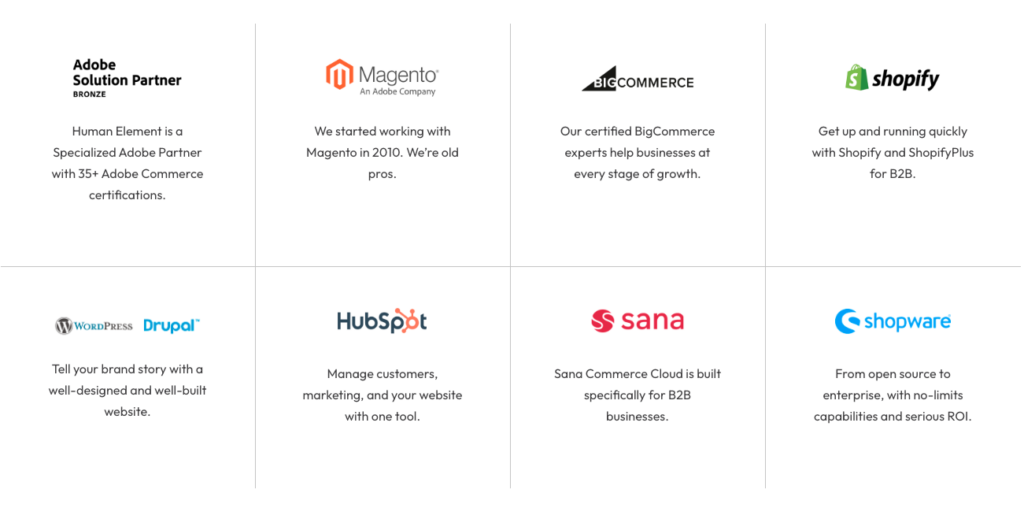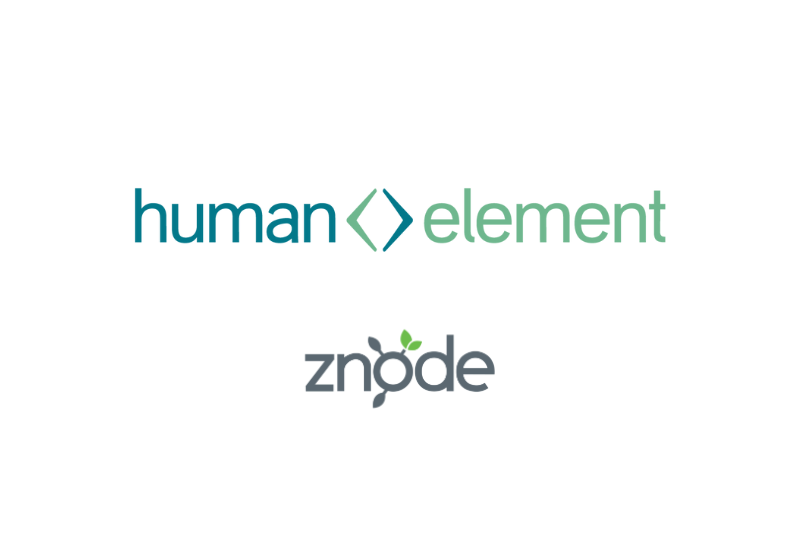Choosing the right eCommerce platform can make or break your business. It’s one of the most significant decisions a company makes when it comes to building or migrating an online store. But with the variety of available options – each with its own strengths, weaknesses, costs, and complexities – the process can quickly become overwhelming. That’s why we here at Human Element developed a Platform Selection Discovery. It’s our strategic and consultative approach that ensures you choose the platform that fits your business’s unique needs. In this blog post, we explore why this discovery process is crucial for building successful eCommerce sites in 2025.
What is Platform Selection Discovery?
Platform Selection Discovery is the process of getting to know the business at a deep level, understanding its goals, and identifying the best eCommerce platform that supports those goals. It’s not just about picking a name from a list; it’s about making an informed decision that will ultimately affect everything from user experience and scalability to how the platform integrates with your broader technology stack.
The discovery process considers not only which platform to choose – whether it’s Shopify, Shopware, Adobe Commerce, BigCommerce, Sana, or custom development – but also how the rest of the tech stack fits into the eCommerce ecosystem. That means looking at everything from ERP integrations to marketing extensions and the platform’s ability to support your future growth.
The goal is simple: empower your business with the right technology that aligns with your current needs and future aspirations, ensuring an optimal experience for both internal users and customers.

Understanding the Problem: Why Platform Selection is Complicated
Today’s eCommerce landscape is complex. There are SaaS platforms like Shopify, Sana, and BigCommerce, on-premise platforms like Adobe Commerce and Shopware, and even options for custom-coded solutions. Each of these has various licensing tiers, capabilities, integration opportunities, and limitations. The reality is, there’s no one-size-fits-all solution.
Choosing an eCommerce platform often involves trade-offs. SaaS solutions may be ideal for companies that want simplicity and agility, but they might not provide the depth of customization needed by a growing enterprise. On-premise platforms might give you that level of flexibility but at the cost of complexity and maintenance. And then there’s custom development, which could provide exactly what you need but involves a higher level of commitment, resources, and long-term investment.
Businesses today are often bombarded with pitches from platform sales reps or have to rely on expensive consultants who may come with their own biases. Making the wrong choice can lead to months of delays, skyrocketing costs, and a platform that fails to meet business requirements – ultimately hindering growth.
The Evolution of eCommerce Platforms

The evolution of eCommerce technology has shifted dramatically over the past few decades. Initially, custom-built solutions were the norm, allowing businesses to create everything from scratch to meet their unique needs. Then, as more off-the-shelf solutions emerged, companies began moving toward licensed platforms that could meet 80% of their needs out of the box, requiring only minor customizations.
Today, we’re seeing a return to hybrid approaches, where businesses might leverage the robustness of a licensed platform while integrating custom-built components to achieve specific business goals. This shift is driven by the need for flexibility, agility, and the growing complexity of modern eCommerce operations.
In 2025, the eCommerce world is moving towards a combination of SaaS, on-premise, and hybrid solutions, depending on the size, needs, and resources of each business. This evolution makes the Platform Selection Discovery process even more important – navigating this complex landscape without guidance is both overwhelming and risky.
Who Needs Platform Selection Discovery?
Platform Selection Discovery is particularly beneficial for mid-market to enterprise-level businesses, typically with revenues in the range of $10 million to $1 billion. These are companies where complexity comes into play – whether it’s about ERP integrations, complex product configurations, or specialized customer requirements.
The discovery process is equally valuable for businesses that are just launching their eCommerce presence. If you’re new to selling online, you likely lack the internal expertise to make an informed decision about which platform will best serve your business goals. Alternatively, if you’re migrating from an outdated platform, the process helps ensure you don’t just replace the old system with something equally limiting, but instead set your business up for future growth.
In both cases, Platform Selection Discovery bridges the gap between the business’s internal expertise and the often complicated, nuanced world of eCommerce platforms.
Avoiding Costly Mistakes
Choosing an eCommerce platform is not just about features and functionality; it’s about ensuring that your business goals align with what the platform can deliver. Without the right guidance, businesses can easily find themselves in situations where they’ve chosen a platform that looks good on paper but falls short in execution.
Platform bloat is a common issue – where the platform accumulates so many features that it becomes cumbersome for the average user. Conversely, choosing a platform that’s too lightweight can leave your team struggling to add features that should have been built-in. The wrong platform can also impact timelines. Imagine embarking on a six-month project only to realize three months in that your platform can’t handle a critical business requirement.
Platform Selection Discovery helps prevent these scenarios. By getting to know your business and understanding the requirements at a fundamental level, the discovery process helps right-size the platform to your needs. It ensures you don’t outgrow the platform too soon or, conversely, spend unnecessary resources on features you’ll never use.
A Consultative, Expert Approach
The strength of the Platform Selection Discovery process lies in its consultative approach. Human Element doesn’t just recommend what’s popular; we consider your business’s unique growth trajectory, existing systems, user capabilities, and goals. This consultative process also involves input from senior technology resources, marketing experts, and strategists to ensure that every angle is covered.
The discovery isn’t just about technical specifications. It’s about understanding what success looks like for your business and what role technology will play in achieving that success. This can mean considering factors like ADA compliance, international market support, data control, and even how platform choices will impact long-term marketing strategies.
In many cases, Platform Selection Discovery also considers the broader tech stack that’s needed to support the platform. What integrations need to be built or maintained? How will this new platform work with your ERP? What are the automation opportunities? These are all questions that come up during the discovery process and influence the final recommendation.
Our Process
The Platform Selection Discovery process is structured and deliberate. Here’s how we do it:
- Discovery Contract: We start with a well-defined contract that outlines the scope of the discovery, the timeline, and the deliverables.
- Client Kickoff: During the kickoff, we introduce key team members and ensure alignment on the project goals, timeline, and expectations. It’s crucial that every stakeholder understands what’s involved.
- Business Discovery: We dive into your business needs through a series of workshops and interviews. This phase includes evaluating current systems, defining business requirements, identifying gaps, and building an understanding of what success looks like. We also assess staffing and training needs, such as whether you’ll need to hire a product catalog manager or if internal development resources can be utilized.
- Internal Review and Analysis: The gathered information is reviewed internally by our team, which often includes strategists, developers, and marketing experts. We conduct additional research as needed and determine the best-fit platform and technology stack for your business.
- Presentation and Recommendations: We present the findings, including detailed recommendations for the platform, the supporting tech stack, and implementation strategies. We also address post-launch considerations and the roadmap for getting started.
Why Low Commitment, High Value Matters
One of the unique aspects of Platform Selection Discovery is that it’s a low-commitment, cost-effective way to leverage Human Element’s expertise. Unlike full-scale development projects, the discovery process has a clearly defined timeline and deliverables, meaning you get value without being locked into a long-term commitment.
This is particularly valuable for businesses that may want to bid out the implementation work or take the project in-house after the discovery phase. While our goal is, of course, to become your implementation partner, we understand that our main responsibility is to give you the best possible recommendation – even if that means you decide to go elsewhere.
Right-Sizing the Platform to the Client
When selecting an eCommerce platform, it’s not about forcing the client to adapt to the platform – it’s about right-sizing the platform to fit the client. Platforms like Adobe Commerce, for example, come with significant licensing fees that may not make sense for a mid-market business. A solution like BigCommerce may work well for some enterprise-level clients but might not provide the flexibility needed to support international markets or stringent data control requirements.
Partnership meetings with eCommerce platforms have taught us a lot about the importance of aligning with the right people in this business. It’s easy to be dazzled by features or big-name customers, but what matters most is alignment with strategic goals. Shopware proved its mettle with a recent proof of concept we tested that cleanly integrated with a broader ecosystem of technologies, solving business challenges.
Platform Selection Discovery ensures that we look at all possible solutions and evaluate them based on the client’s needs. Whether it’s about making sure ERP integrations are seamless, supporting advanced product configurations, or providing robust analytics and reporting capabilities, the goal is always to find the platform that aligns with your business, not the other way around.
Key Considerations and Scenarios
To make an informed decision, there are several key considerations that need to be evaluated during the discovery process:
- Budget: How much is budgeted for website launch and ongoing maintenance?
- Growth Projections: How quickly do you plan to scale, and will the platform be able to grow with you?
- Customization: How important is the ability to customize the platform? Are there specific features or workflows you need?
- Data Control: Do you need full control over your data, or are you comfortable with a SaaS platform where data may be more restricted?
- Vendor Lock-In: Are you comfortable with potential vendor lock-in, or do you want the flexibility to move off the platform in the future?
- Internal Resources: Do you have the right internal resources, such as development and IT teams, to support an on-premise solution, or do you need the simplicity of a SaaS?
Whether you’re launching eCommerce for the first time or moving away from an outdated legacy system, Platform Selection Discovery provides the answers to these questions and ensures that your next step is the right one.
The Importance of the Broader Tech Stack
An eCommerce platform is rarely a standalone system. It’s part of a broader technology ecosystem, which might include ERP software, marketing automation tools, customer service solutions, and more. During Platform Selection Discovery, we don’t just evaluate the platform’s capabilities – we also look at how well it integrates with your existing systems.
For instance, if you’re already using a particular ERP, we’ll need to consider which platforms can integrate seamlessly with it. Similarly, if your marketing team relies heavily on a specific tool for email campaigns, we need to ensure that the selected platform can support that tool or offer suitable alternatives.
The discovery process is about painting a complete picture of your eCommerce ecosystem – not just the storefront.
Avoiding Platform Mismatch and the Path Forward
Platform mismatch can lead to overpromise and under-delivery – resulting in frustration, wasted time, and hindered growth. Our Platform Selection Discovery service at Human Element helps you avoid this scenario by aligning the right technology with your business strategy.
By combining our industry expertise with an in-depth understanding of your business needs, we help set the foundation for success. This discovery process provides the clarity needed to make informed, confident decisions about the future of your eCommerce presence.
If you’re planning to launch or upgrade your eCommerce site in 2025, consider making Platform Selection Discovery part of the plan. It’s the smart way to ensure that your technology supports, rather than hinders, your growth.



